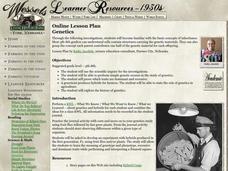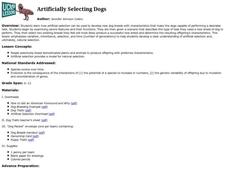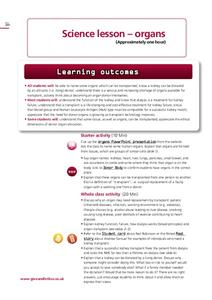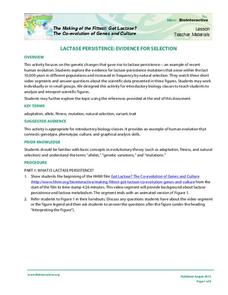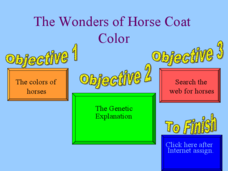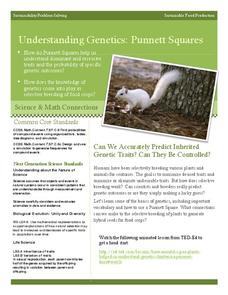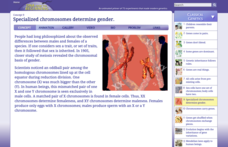Curated OER
Fun with Heredity
Learners explore basic concepts of heredity and collaborate to see genetics in action through several activities provided in the instructional activity. Inherited traits are examined and identified as dominant or recessive.
Curated OER
Rock, Paper, Scissors
Fifth graders explore genetic traits. In this genetic traits lesson, 5th graders investigate dominant and recessive traits. Students identify similar traits between a parent organism and its offspring.
Curated OER
Genes
Young scholars explore the history, inheritance and mutations of genetics. In this genetic lesson students complete experiments on DNA sequences.
Agriculture in the Classroom
Roll of the Genes
Animal reproduction in sheep and cattle is explored with the help of Punnet squares. Scholars employ tools using probability to conclude the color of wool a sheep's offspring will have. Acting as animal geneticists, pupils then take...
Serendip
DNA
Get up close and personal with DNA! A two-part hands-on activity has learners extract DNA from a small organism and then their own cheek cells. Scholars then explore DNA replication using questions to guide their analyses.
Curated OER
A Bug's Life: Diary of an Insect's Metamorphosis
Fifth graders examine the stages of insect's to understand heredity. For this inherited traits lesson, 5th graders explore the life of the honeybee for its inherited traits. Students recognize the difference between inherited traits and...
Curated OER
Pets: Oh Behave
Students develop an understanding of how innate and learned behaviors and the environment determine behavior. They see how a variety of factors affects our pet's behavior-including species-specific traits, the environment, training, and...
Curated OER
Lesson 10: Karyotypes
Young scholars predict traits of future offspring. In this biology lesson, students study karyotyping to predict genetic disorders. They research an assigned karyotype and present information about it.
Curated OER
Genetics
Become familiar with the basic concepts of inheritance. Your junior high students work through mulitple examples of crosses and calculate probabilities of trait occurance. The explain the concept that each parent contributes one half of...
Curated OER
High-Tech Food: Science in Your Shopping Cart
Kids are given a lot to think about, as they delve into the world of high-tech foods. They discuss GMOs, biotechnology, food enhancements and domestication. They view videos, engage in class discussions, complete worksheets, and learn...
Curated OER
Genetics
Trace simple genetic patterns of inheritance through a small population. Your students create a family pedigree that traces a genetic condition through several generations.
University of California
Artificially Selecting Dogs
Selective breeding has resulted in some novel and beautiful or useful dogs over the years. Using the American Foxhound as an example, genetics learners find out how and why they came about. Then, in small groups, they select breeds to...
Give and Let Live
Blood and Transplant: Organs
Who donates organs, and how do organ donations work? The third lesson in a four-part series discusses the tremendous need for donor organs of all ages and backgrounds. A variety of materials, included with the teacher's guide, walk...
Howard Hughes Medical Institute
Lactase Persistence: Evidence for Selection
What's the link between lactase persistence and dairy farming? Biology scholars analyze data to find evidence of the connection, then relate this to human adaptation. Working individually and in small groups, learners view short video...
Curated OER
Mendel Pea Plants
In this Mendelian genetics activity, students answer a variety of questions about Mendel's experiments and discoveries and they practice determining probability of outcomes in pea plants.
Curated OER
The Wonders of Horse Coat Color
You won't be able to use a few of the slides in this presentation since the first lists objectives not met within, and the third gives instructions to a worksheet that is not included. You will, however, find the remaining slides useful...
Western Kentucky University
Understanding Genetics: Punnett Squares
Can scientists really predict genetic outcomes or are they simply making a lucky guess? Scholars first learn about Gregor Mendel and how to make Punnett squares. Then they extract DNA from a strawberry in a lab with included conclusion...
National Center for Case Study Teaching in Science
In Sickness and in Health
Based on family history, how likely is it that a couple's children will have a recessive disease? In an in-depth, but easy-to-follow case study, future geneticists learn the story of Greg and Olga, who are hoping to have children, but...
Serendip
Should States Repeal Their Laws Banning First Cousin Marriage?
Around half of the states in the US ban first cousin marriage, but does science support that ban? Scholars work through genetic analysis of the risks to understand if more states should ban the practice—or if some should remove it. They...
Howard Hughes Medical Institute
Color Variation over Time in Rock Pocket Mouse Populations
A species-specific look at natural selection, the resource herein examines how adaptations have helped the population of rock pocket mice survive in a changing landscape. To begin, middle or high schoolers watch a 10.5 minute video,...
Curated OER
Genetic Disorders
Students examine how living cells create new cells and how genetic mutations can cause disorders and be inherited. In this genetic reproductionn lesson students create their own PowerPoint presentation.
Agriculture in the Classroom
A Rafter of Turkeys
How did that turkey get from the early Aztec culture to your table? Learn about the history of wild and domesticated turkeys in North America, as well as their inclusion in Thanksgiving traditions, with a two-part agricultural science...
Cold Spring Harbor Laboratory
Specialized Chromosomes Determine Gender
Are you an XX or an XY? Budding scientists learn about cellular fertilization and the determination of gender in a thorough online lesson. They follow their study with a set of interactive reflection questions.
Serendip
The Molecular Biology of Mutations and Muscular Dystrophy
Different types of mutations cause unique types and degrees of muscular dystrophy. Scholars learn about the types of mutations and the impact on the body. They compare the location of the mutations and draw conclusions about how it is...
Other popular searches
- Learned and Inherited Traits
- Inherited Learned Traits
- Inherited vs. Learned Traits
- Inherited vs Learned Traits










